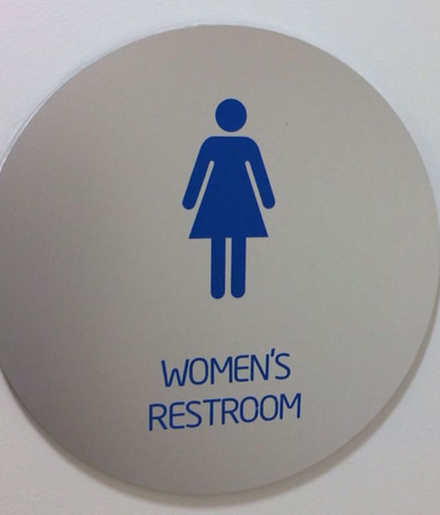By Katherine Gibson (The Cascade) – Email
Print Edition: February 19, 2014

With short spiked hair, a bright smile, and an air of fearlessness, Sue Harvey is reminiscent of Pink.
Except Pink is a platinum-selling artist and has never had to fight discrimination in UFV bathrooms.
Harvey, a third-year criminology and political science student at UFV, is no stranger to discrimination. From an early age, it was apparent to Harvey that her choice to cut her hair short and avoid stereotypically feminine clothing was a choice open to teasing, as well as gender confusion from adults.
“I was teased [because] I had short hair when I was a kid,” says Harvey. “I grew my hair out once in an off-season in grade eight … and it looked horrible … short hair just suits me.
“When I was like five years old, I remember there was a point where I gave up and I just started going to the guy’s washroom,” she continues. “In my mind it was easier for me — the world wanted me to do this, according to all the adults … and so I was like, ‘Fine. I’ll go where they want me to go even though it’s wrong.’”
Cut to present day, and Harvey is still facing the same teasing and gender confusion from her peers. During the first week of the winter semester, on a break from class, Harvey was washing her hands in the women’s washroom when another female student walked in.
“I was washing my hands and this girl walked in and said, ‘Oh!’ [then] turned, and walked out,” explains Harvey, “and then [I] heard giggling outside the door immediately after she left.
“I walked out [of the washroom] and there was group waiting to go in a class and so I said, ‘Who just came out of here?’” she says. “Then [a girl] who was standing [in the group] said, ‘Excuse me,’ and passed me into the washroom.”
Encounters like these are common when Harvey goes into a women’s washroom and are a source of frustration. Mostly because, more often than not, the person uncomfortable with Harvey’s presence is unwilling to have an open dialogue about where their discomfort is coming from.
“The silliness is that [the girl] wasn’t even willing to talk about it, which again is not unusual,” Harvey notes. “I went back to class and I was just annoyed because I deal with this all the time.”
These bathroom encounters are not isolated events, but speak to the larger issue of gender misunderstanding surrounding Harvey in everyday life. For Harvey, normal activities, like going to the gym, open the door for people to question her identity.
“I’ve now stopped going to a female-only gym in Abbotsford because, despite it saying, ‘No judgement’ on the wall, I would get stared at quite often there,” she explains. “And at the gym I throw clues out there … I wear pink gym shoes, I have pink lifting gloves, so I’m very ‘pinked’ at the gym. Even at work I have my pink watch, so I try and throw people a bone.”
While Harvey has come to accept she will be judged because of her appearance by the general public, she finds it discouraging that even at UFV there is no real difference in the way she is treated, despite claims of diversity and acceptance.
“The entire purpose of pretty much any university, with some exceptions, is diversity and acceptance. This is where you grow as a person,” Harvey says.
“The people that choose to go to university, they choose to create enlightenment in their lives and gain experience. So, this is supposed to be the safe haven out of all places,” she goes on. “One would think that if you’re going to be accepted anywhere … it would be at the university.”
Harvey speaks as a strong person willing to push back against society’s judgement of her. A police officer for over five years and ex-military, Harvey has learned how to stand up for herself. Working under the “don’t ask, don’t tell” policy during her time in the U.S. military and ultimately receiving an honourable discharge for her choice to push back against it, Harvey has cultured a way of maintaining her identity no matter what the circumstances.
“Am I stupid for standing up? No, because clearly the way things have worked out I was right and many, many soldiers before me were right,” she says. “You talk about discrimination, that was one of the biggest forms right there.”
The U.S. military’s 17-year-old “don’t ask, don’t tell” policy was ultimately repealed in 2011. However, Harvey is concerned the effects of policies like these, as well as the ongoing discrimination felt among her peers will hinder and hurt others less solidified in their identity.
“I stand up,” she says, “but I know that there are a lot of people out there that don’t have that courage and will let people beat them down emotionally.
The effects of discrimination and bullying over physical appearance are a prevalent source of discussion. The death of 15-year-old Helena Farrell in November 2013 in the UK, bullied all her life because of her red hair, is only one of many reminders of the importance of understanding and acceptance when it comes to personal appearance.
While Harvey acknowledges she does not have all the answers, creating anti-discrimination forums at UFV is one practical step that she believes the university could take in building more awareness regarding this issue. Beyond that, Harvey believes simply treating others with kindness will also help break the cycle of discrimination.
“I find Ellen quite inspiring and every show she says, ‘be kind to one another,’” Harvey says. “All it takes is holding the door for one person, smiling, saying hi, being nice — it sounds so silly but that’s what makes people’s days.”


